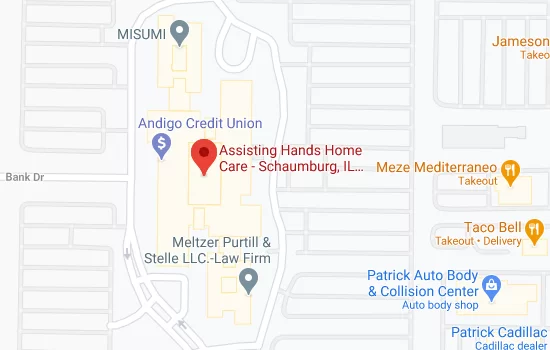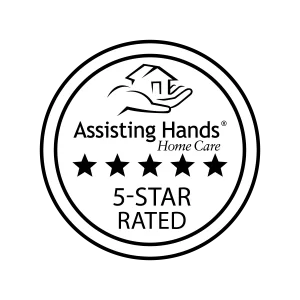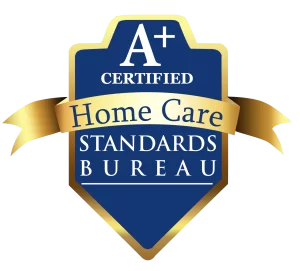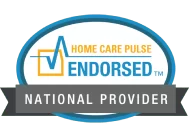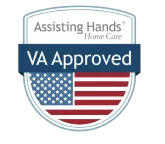Home Care FAQ
Trusted Caregivers Providing Seniors and Families
with Exceptional In-Home Care.
Home Care Services FAQ
Home Care provides non-medical assistance with daily living activities (ADLs) and instrumental activities (IADLs), such as bathing, dressing, meal preparation, medication reminders, light housekeeping, transportation, and companionship. Care is offered by caregivers or home care aides who do not need medical training.
Home Health Care involves skilled medical services delivered by licensed healthcare professionals, typically prescribed by a physician. It's aimed at individuals recovering from illness or managing chronic conditions. Services include wound care, medication management, injections, vital signs monitoring, rehabilitation therapies, and management of medical equipment, provided by registered nurses, licensed practical nurses, physical therapists, occupational therapists, speech therapists, and certified nursing assistants.
A home care agency is a company that employs and manages caregivers, offering a variety of in-home care services. In contrast, a caregiver is the individual who provides personal assistance directly to clients, often through an agency or independently.
Scope of Services:
Home care agencies provide a broader range of services, including medical care, personal care, housekeeping, meal preparation, and transportation. Caregivers focus on specific tasks like bathing, dressing, medication reminders, and companionship, tailored to client needs.
Employment:
Caregivers are employed by the home care agency, which manages payroll, background checks, and replacement staffing.
Liability:
The home care agency is liable for the actions of its caregivers, whereas with independent caregivers, families may need to address any issues directly.
The main difference between a caregiver and a live-in caregiver is their availability:
Caregivers
- Visit a client's home during set hours to provide care and assistance.
Live-In Caregivers
- Reside in the same home as the person they care for, offering continuous support and being available around the clock.
Tasks performed by live-in caregivers include:
- Assisting with bathing, dressing, and hygiene
- Meal planning and preparation
- Light housekeeping and laundry
- Providing transportation to appointments
- Offering companionship and socialization
Cost Consideration: Live-in care typically costs about 60-70% of 24/7 care. The latter may be necessary for clients who require constant supervision or are in critical care or hospice situations.
The most common home care service is assistance with activities of daily living (ADLs), which includes help with tasks such as bathing, dressing, eating, and taking medications. These services support individuals with disabilities or seniors, enabling them to live independently and comfortably in their own homes.
The most requested support service for the elderly is personal care, which includes assistance with daily activities like bathing, dressing, and grooming. This support helps seniors maintain independence while managing mobility challenges at home.
Other commonly requested services include:
- Mobility Assistance: Help with moving around the home or running errands.
- Medication Management: Ensuring proper medication intake.
- Meal Preparation and Nutrition Support: Providing healthy meals or cooking assistance.
- Transportation Services: Driving to appointments or errands.
- Homemaking Assistance: Cleaning, laundry, and household chores.
- Companionship and Social Interaction: Offering conversation and activities to reduce loneliness.
In-Home Caregivers FAQ
Yes, reputable home care agencies like Assisting Hands make sure that their caregivers are:
- Insured: This protects both the caregiver and the client in case of accidents or injuries during care.
- Bonded: Bonding provides financial protection against theft or dishonesty, offering peace of mind to clients.
- Licensed: Depending on the type of care provided, some caregivers may need specific licenses or certifications, especially if they perform medical tasks.
- Background-Checked: Comprehensive background checks are standard to ensure the safety and reliability of caregivers, including checks for criminal history and previous employment.
These measures help ensure that caregivers are qualified, trustworthy, and capable of providing high-quality care.
Caregivers are typically supervised through a combination of methods, including:
- Regular Check-Ins: Supervisors conduct scheduled visits to observe caregiver performance and ensure quality of care.
- Client Feedback: We encourage clients and their families to provide feedback on the caregiver’s performance, which helps identify any areas for improvement.
- Care Plans: Caregivers follow individualized care plans, and supervisors review these plans regularly to ensure they are being implemented correctly.
- Training and Support: Ongoing training sessions and workshops help caregivers stay updated on best practices and allow for skill reinforcement.
- Performance Evaluations: Regular evaluations assess caregiver competencies and address any concerns or areas for development.
- Communication: Open lines of communication between caregivers and supervisors facilitate ongoing support and guidance.
These supervision methods help maintain high standards of care and ensure that caregivers are meeting the needs of their clients effectively.
Whether you will always have the same caregiver depends on your specific needs. We strive to provide consistency by assigning the same caregiver for regular visits, which helps build a trusting relationship. However, circumstances such as caregiver availability, scheduling conflicts, or the need for different skills may result in changes.
If having the same caregiver is important to you, it's best to communicate this preference to our agency. We can work to accommodate your request as much as possible, while also ensuring continuity of care when needed.
If your caregiver is not a good fit, you should take the following steps:
- Communicate Your Concerns: Share your specific concerns with the caregiver directly, if comfortable, or discuss them with our home care agency. Open communication can sometimes resolve issues.
- Contact the Agency: Inform the agency about your concerns. We can provide support and may suggest solutions, including reassigning a different caregiver.
- Request a Replacement: We understand that compatibility is essential for effective care. You can request a new caregiver who better meets your preferences and needs.
- Trial Period: We offer a trial period with caregivers, allowing you to assess the fit before making a longer commitment.
The goal is to ensure you feel comfortable and supported in your care environment, so don't hesitate to advocate for your needs.
If your caregiver does not show up for a scheduled shift, here are the steps you should take:
- Contact our Agency: Reach out to us as soon as possible. We have a protocol for handling missed shifts and can provide updates or send a replacement.
- Request a Replacement: If we cannot send the same caregiver, we will arrange for another qualified caregiver to come to your home.
- Discuss the Situation: Once the issue is resolved, discuss your experience with us to help prevent future occurrences and ensure consistent care.
Effective communication with our agency is key to resolving any issues quickly and ensuring you receive the support you need.
Illinois Home Care Cost Questions
In Illinois, the cost of private home care typically ranges from $38 to $45 per hour, depending on factors such as the type of care needed, the caregiver's qualifications, and the location within the state. Specialized care, such as for medical needs, may be on the higher end of this range or even exceed it.
Medicaid can cover 24-hour home care in Illinois, but there are specific eligibility criteria and conditions that must be met. Coverage often falls under programs like the Home and Community-Based Services (HCBS) waiver. These programs aim to support individuals who require assistance due to disabilities or aging, allowing them to receive care in their homes rather than in institutional settings.
To qualify, applicants typically need to demonstrate a medical need for assistance with activities of daily living (ADLs) and meet income and asset limits set by Medicaid. It's advisable to contact the Illinois Department of Healthcare and Family Services or a local Medicaid office for detailed information about eligibility and the application process.
Paying privately for 24 hour home healthcare services is often a necessary option for individuals who want to remain living independently in their homes. Since Medicaid and Medicare typically do not pay for Long-Term Care, the burden of payment becomes that of the individual or their extended family.
Medicare covers 100% of the cost of medically necessary home health care in Illinois if the care is part-time or intermittent, and less than 28 hours per week.
The payment rates for home health care services under Medicare can differ from state to state due to variations in the cost of living and other factors. In 2024 in Illinois Average Payment Rate per Hour is $17.81.
Average Payment Rate per Hour by Service
Skilled Nursing Care - $37.89
Physical Therapy - $49.63
Occupational Therapy - $43.81
Speech-Language Pathology - $37.05
Medicare coverage for home health care services is subject to certain limitations. While Medicare Part A covers eligible home health services, it does not cover 24-hour care or custodial care. Instead, Medicare Part A covers intermittent skilled nursing care, home health aide services, and therapy services when prescribed by a doctor.
In addition to coverage limits, beneficiaries may also be responsible for certain out-of-pocket expenses. This can include deductibles, copayments, and coinsurance. It's crucial for beneficiaries to review their specific Medicare plan to understand the cost-sharing requirements and any potential limitations.
More information: https://www.springhills.com/resources/how-much-does-medicare-pay-for-home-health-care-per-hour
According to 2024 data, the national average cost for 24/7 in-home care is around $18,144 per month based on a typical hourly rate of $27 per hour; however, this price can vary significantly depending on your location, the level of care needed, and the specific care provider you choose.
Key factors affecting the cost:
Location - Different areas have different cost of living, impacting the cost of in-home care.
Care level - More complex medical needs require specialized caregivers, increasing the cost.
Caregiver qualifications - Highly skilled caregivers like registered nurses may charge higher rates.
Number of caregivers - If multiple caregivers are needed to provide around-the-clock care, the cost will be higher.
In Illinois, the cost of 24/7 in-home care typically ranges from $15,000 to $25,000 per month. This can vary based on factors such as the level of care required, the caregiver's qualifications, and the specific services provided. Call Assisting Hands for personalized care plans and accurate estimates.
If you are a veteran or the spouse of a veteran and over the age of 65, you may be eligible for benefits from the Department of Veteran’s Affairs. The Department of Veteran’s Affairs offers these benefits to veterans and their spouses to help them pay for care, including home care, and you must apply with the Department to receive your benefits. If you do receive VA benefits, these benefits can cover the cost of our VA home care services.
More information: https://assistinghandsschaumburg.com/blog/who-can-benefit-from-va-home-care/
https://assistinghandsschaumburg.com/blog/eligibility-apply-va-care-illinois/
https://assistinghandsschaumburg.com/blog/veterans-home-care-illinois-faq/
In-Home Service (IHS) in Illinois is a program that provides assistance to eligible individuals in their homes to help them live independently. The program is administered by the Illinois Department of Human Services (IDHS).
IHSS services can include:
Personal care - Assistance with activities like dressing, bathing, grooming, and following special diets
Household tasks - Help with cleaning, meal preparation, laundry, shopping, and running errands
Case management - A personal case manager to ensure the individual receives the services they need
Training and counseling - Training and counseling for unpaid family members or guardians who provide support
Non-medical transportation - Assistance with non-medical transportation
Nursing assistance - Nursing assistance and emergency home response
To locate an In-Home Service Provider in your area, you can use the Service Locator or contact the Senior HelpLine - https://ilaging.illinois.gov/programs/homemaker.html
General Questions
Power of Attorney (POA) for seniors is a legal document that allows an individual (the "principal") to designate another person (the "agent" or "attorney-in-fact") to make decisions on their behalf, particularly when they become unable to do so themselves.
A power of attorney should be a part of every senior’s preparation for the future. This document informs family members about the elderly person’s wishes in the event the latter becomes incapacitated. Here’s what caregivers and their aging loved ones should know about power of attorney: https://assistinghandsschaumburg.com/blog/what-is-power-of-attorney-for-seniors/
Pros
- Supplemental Income: Working can provide additional financial support, helping to cover living expenses or fund leisure activities.
- Social Interaction: Staying in the workforce allows retirees to maintain social connections and combat loneliness.
- Mental Stimulation: Engaging in work can keep the mind active and sharp, reducing the risk of cognitive decline.
- Purpose and Fulfillment: Many retirees find a sense of purpose and fulfillment in their work, contributing to their community or pursuing passions.
- Flexibility: Part-time or freelance work offers the flexibility to choose hours and responsibilities that fit a retiree’s lifestyle.
- Health Benefits: Some jobs offer health insurance or other benefits that can be valuable in retirement.
Cons
- Time Commitment: Working can take time away from leisure activities, travel, or family commitments that retirees might want to enjoy.
- Physical and Mental Strain: Depending on the job, work can be physically demanding or stressful, which may not align with the desires of a retiree.
- Tax Implications: Additional income may impact tax liabilities or benefits, such as Social Security.
- Job Market Challenges: Finding suitable work can be difficult, especially if technology or job requirements have changed significantly since retirement.
- Reduced Leisure Time: Balancing work and personal life may leave less time for hobbies, relaxation, or spending time with loved ones.
- Adjustment Period: Transitioning back into a work environment can be challenging and may require adjustment to a more structured schedule.
It is common for seniors to continue working after retirement to keep a steady income and have a sense of purpose. However, working after retirement may not be the best choice for everyone. Here are some things you can consider before you submit your application for a job: https://assistinghandsschaumburg.com/blog/pros-and-cons-of-working-after-retirement/
Choosing the right care for your loved one depends on various factors, including their specific needs, preferences, and health conditions. Here are some options to consider:
1. In-Home Care
- Personal Care: Assistance with daily activities like bathing, dressing, and grooming.
- Companionship: Providing social interaction and support to combat loneliness.
- Homemaking Services: Help with housekeeping, meal preparation, and laundry.
- Skilled Nursing Care: Medical care provided by registered nurses for chronic conditions, medication management, or rehabilitation.
2. Adult Day Care
- Offers social activities, meals, and sometimes medical care during the day, providing caregivers with respite while ensuring the loved one is engaged and supervised.
3. Assisted Living
- For individuals who need help with daily activities but do not require 24-hour medical care. This setting provides a community environment with support services.
4. Nursing Homes
- Suitable for individuals who need more intensive medical care and supervision, often due to severe health conditions or disabilities.
5. Memory Care Facilities
- Specialized care for individuals with Alzheimer’s or other dementias, focusing on safety, structured routines, and cognitive support.
6. Palliative Care
- Focuses on providing relief from symptoms and improving quality of life for those with serious illnesses, regardless of the stage of the disease.
7. Hospice Care
- Designed for individuals with a terminal illness, focusing on comfort and quality of life in the final stages, often provided at home or in a specialized facility.
Factors to Consider
- Health Needs: Assess the medical and personal care requirements of your loved one.
- Living Situation: Consider whether they can remain safely at home or need a more supportive environment.
- Financial Resources: Evaluate insurance coverage, savings, and potential costs associated with different care options.
- Preferences: Discuss with your loved one their wishes and preferences regarding care and living arrangements.
- Family Support: Consider the availability of family members to assist and the level of involvement they can provide.
Conclusion
It’s important to evaluate all these options carefully and possibly consult healthcare professionals to determine the best care solution that fits your loved one’s needs and preferences. A comprehensive approach will ensure they receive the right level of support while maintaining their dignity and quality of life.
Family Caregivers FAQ
By implementing the below strategies, you can help seniors manage their medications more effectively and maintain their health.
- Medication Management Systems: Use pill organizers with compartments for each day or time of day to simplify dosing.
- Reminders: Set alarms on phones or use medication reminder apps that provide notifications when it’s time to take medication.
- Routine Integration: Encourage taking medications at the same time as daily activities, like brushing teeth or having meals, to create a routine.
- Visual Aids: Place notes or labels in visible areas, like on the fridge or bathroom mirror, as gentle reminders.
- Involve Family: Encourage family members to check in regularly, either through phone calls or visits, to remind them about their medication.
- Smart Technology: Consider devices like automated pill dispensers that can alert seniors when it’s time to take their medication and even dispense the correct dose.
- Regular Check-ins: Schedule regular visits or phone calls to discuss their medication and ensure they're following their regimen.
- Education: Help seniors understand the importance of their medications, discussing how each one contributes to their health.
- Create a Medication Schedule: Work with a healthcare provider to create a clear and simple medication schedule that outlines when to take each medication.
More information: https://assistinghandsschaumburg.com/blog/elderly-forgetting-medication-tips/
- Acknowledge Your Feelings: Recognize that it's normal to feel overwhelmed or depressed. Allow yourself to feel these emotions without guilt.
- Seek Support: Talk to friends, family, or support groups. Sharing your experiences with others who understand can provide relief and perspective.
- Take Breaks: Schedule regular breaks to recharge. Even short periods of rest can help reduce stress and prevent burnout.
- Set Realistic Expectations: Understand that you can’t do everything perfectly. Prioritize tasks and be kind to yourself about what you can achieve.
- Practice Self-Care: Engage in activities that bring you joy and relaxation, such as exercise, hobbies, or spending time in nature.
- Professional Help: Consider talking to a mental health professional who can provide coping strategies and support.
- Utilize Respite Care: Look into respite care options to temporarily relieve you from caregiving duties, allowing you time to rest.
- Stay Organized: Keep a schedule to help manage daily tasks, which can reduce feelings of chaos and overwhelm.
- Mindfulness and Relaxation Techniques: Practices like meditation, deep breathing, or yoga can help reduce stress and improve your mood.
- Educate Yourself: Understanding the condition of the person you care for can help you feel more equipped and less anxious.
More information: https://assistinghandsschaumburg.com/blog/caregivers-how-to-manage-stress-and-burnout/
1. Understand the Condition
- Educate Yourself: Learn about your loved one’s specific chronic condition, including symptoms, treatment options, and management strategies.
- Know Their Needs: Understand how the condition affects their daily life and what specific care they require.
2. Create a Care Plan
- Collaborate with Healthcare Providers: Work with doctors, nurses, and specialists to develop a personalized care plan that outlines treatment, medications, and daily routines.
- Set Goals: Establish short-term and long-term goals for their health and well-being.
3. Manage Medications
- Medication Management: Keep an organized medication schedule and use pill organizers or apps to help them remember to take their medications on time.
- Monitor Side Effects: Be vigilant about any side effects and report them to their healthcare provider.
4. Encourage Healthy Lifestyle Choices
- Nutrition: Provide balanced meals that align with dietary recommendations related to their condition. Consider consulting a nutritionist.
- Physical Activity: Encourage appropriate exercise based on their capabilities and doctor’s advice, such as walking or gentle stretching.
5. Provide Emotional Support
- Listen and Communicate: Be there to listen to their concerns and feelings. Open communication can alleviate anxiety and feelings of isolation.
- Engage Socially: Encourage social interaction with friends and family, as well as participation in community activities or support groups.
6. Ensure Safety and Comfort
- Home Modifications: Make necessary adjustments to their living space to enhance safety, such as removing tripping hazards and installing grab bars.
- Comfortable Environment: Create a peaceful and comfortable environment that accommodates their needs.
7. Coordinate Care
- Schedule Regular Check-Ups: Ensure they have regular medical appointments for monitoring their condition and managing treatments.
- Involve Other Family Members: Share caregiving responsibilities among family members to prevent burnout.
8. Seek Professional Help
- Home Health Aides: Consider hiring professional caregivers or home health aides for additional support, especially for tasks like personal care or medication management.
- Respite Care: Utilize respite care services to give yourself breaks and maintain your own well-being.
9. Practice Self-Care
- Take Care of Yourself: Ensure you’re also managing your physical and mental health. Caregiving can be demanding, so prioritize self-care.
10. Stay Informed
- Keep Up with Research: Stay informed about advancements in treatment and care related to their chronic condition.
By taking a holistic approach and ensuring support for both your loved one and yourself, you can improve their quality of life while managing the challenges of chronic conditions.
More information: https://assistinghandsschaumburg.com/blog/elderly-with-chronic-conditions-care-tips/







